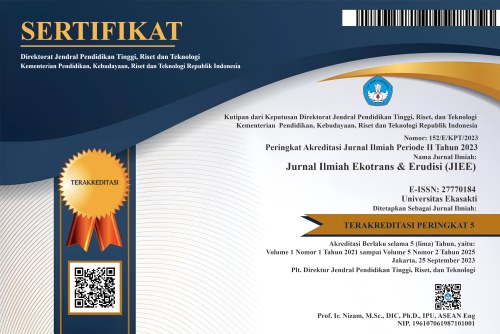The Influence of Ethical Climate on The Organizational Commitment of Nurses in Government Hospitals in Padang, Indonesia
DOI:
https://doi.org/10.69989/edv5y820Keywords:
Ethical climate, organizational commitment, nursesAbstract
Commitment of nurses to hospitals remains a challenge in human resource management. One factor influencing organizational commitment is ethical climate, an individual's perception of values, norms, and moral standards in the work environment. A positive ethical climate is believed to increase nurses' loyalty and emotional attachment to the institution. This study aims to analyze the effect of ethical climate on organizational commitment among nurses in government hospitals in Padang City, Indonesia. This is a quantitative explanatory study with a sample of 69 nurses who met the inclusion criteria, taken by proportional random sampling. Data were collected using a questionnaire and analyzed with SmartPLS. The results showed a significant positive effect of the ethical climate of benevolence and principles (caring, independent, law and code, rules) on organizational commitment (T-statistic 7.715; P value 0.000; sample mean 0.745, R square 0.440), and there was no effect of instrumental climate on organizational commitment. A positive ethical climate that reflects caring, compliance with rules, and the principle that every action and decision is based on personal or professional standards can strengthen nurses' commitment to the organization. Strengthening ethical culture is important in building sustainable and quality-oriented health services.
Downloads
References
Allen, N. J., & Meyer, J. P. (1993). Organizational commitment: Evidence of career stage effects? Journal of Business Research, 26, 49–61.
Aulia, A., & Rita, N. (2021). Hubungan jenis kelamin, masa kerja, komitmen organisasi, gaya kepemimpinan dan kejadian burnout pada Perawat di Rumah Sakit. Jurnal Kesehatan Lentera ‘Aisyiyah, 4(2), 492–501. http://jurnal.politasumbar.ac.id/index.php/jl/article/view/106
Badan Pusat Statistik Kota Padang. (2022). Jumlah Rumah Sakit 2022. https://padangkota.bps.go.id/id/statistics-table/2/ODIjMg%3D%3D/jumlah-rumah-sakit.html
Coughlan, R. (2005). Employee Loyalty as Adherence to Shared Moral Values. Journal of Managerial Issues, 17(1), 43–57. http://www.jstor.org/stable/40604474.
Cullen, J. B., Parboteeah, K. P., & Victor, B. (2003). The effects of ethical climates on organizational commitment: A two-study analysis. Journal of Business Ethics, 2(46), 127–141.
Firdaus, A. (2017). Faktor-faktor yang mempengaruhi turnover intention (studi pada karyawan perusahaan jasa multi finance di Kota Jambi). EKONOMIS : Journal of Economics and Business, 1(1), 1. https://doi.org/10.33087/ekonomis.v1i1.2
Gozali, Z. R. (2022). Pengaruh stres kerja terhadap komitmen organisasi pada Perawat Unit Rawat Inap RSUD Sekarwangi. Jurnal Riset Psikologi, 27–32. https://doi.org/10.29313/jrp.v2i1.677
Hashish, E. A. A. (2017). Relationship between ethical work climate and nurses’ perception of organizational support, commitment, job satisfaction and turnover intent. Nursing Ethics, 24(2), 151–166. https://doi.org/10.1177/0969733015594667
Kementerian Kesehatan Republik Indonesia. (2019). Profil kesehatan Indonesia 2018. Kementerian Kesehatan RI.
Lanes, T., Dalmolin, G. de L., da Silva, A. M., Schutz, T., Magnago, T. S. B. de S., & Andolhe, R. (2023). Nurses’ assessment of the ethical climate of a university hospital in the South of Brazil. Journal of Research in Nursing, 28(1), 23–35. https://doi.org/https://doi.org/10.1177/17449871231152081
Lemmenes, D., Valentine, P., Gwizdalski, P., Vincent, C., & Liao, C. (2016). Nurses’ perception of ethical climate at a large academic medical center. Nursing Ethics, 25(6), 724–733. https://doi.org/10.1177/0969733016664980
Mansoara, N., & Armanu, A. P. (2021). The effect between ethical climate and organizational culture on deviant behavior through organizational commitment as a mediation variable (studies on civil servants at the Regional Secretariat Manokwari Regency Government). South East Asia Journal of Contemporary Business, Economics and Law, 24(1), 1.
Martin, K. D., & Cullen, J. B. (2006). Continuities and extensions of ethical climate theory: A meta-analytic review. Journal of Business Ethics, 69(2), 175–194.
Meyer, J. P., & Allen, N. J. (1991). A three-component conceptualization of organizational commitment. Human Resource Management Review, 1(1), 61–89. https://doi.org/https://doi.org/10.1016/1053-4822(91)90011-Z
Meyer, J. P., & Allen, N. J. (1997). Commitment in the workplace: Theory, research, and application. In SAGE Publications, Inc.
Muhson, A. (2022). Analisis statistik dengan SmartPLS. Universitas Negeri Yogyakarta.
Mus, A., Koesmono, T., & Wulani, F. (2017). Pengaruh motivasi kerja dan komitmen organisasional terhadap kepuasan kerja pada Perawat Rumah Sakit Umum Daerah Bobong. Kajian Ilmiah Mahasiswa Manajemen (KAMMA), 6(1), 1–10. https://doi.org/10.32639/fokusbisnis.v10i2.139
Noh, Y. G., & Jung, M. S. (2016). Path analysis of the influence of hospital ethical climate perceived by nurses on supervisor trust and organizational effectiveness. Journal of Korean Academy of Nursing, 46(6), 824–835. https://doi.org/https://doi.org/10.4040/JKAN.2016.46.6.824
Prabowo, G. . (2015). Pengaruh kepuasan kerja dan komitmen karyawan terhadap kinerja karyawan PT.Kusuma Sandang Mekarjaya Sleman Yogyakarta. Fakultas Ekonomi Universitas Negeri Yogyakarta.
Priansa, D. J. (2016). Perencanaan dan pengembangan SDM. Alfabeta.
Robbie, I., & Praharjo, A. (2020). Bagaimana iklim etis dan gaya kepemimpinan berpengaruh terhadap efektifitas pemimpin? At-Tadbir : Jurnal Ilmiah Manajemen, 4(2), 81. https://doi.org/10.31602/atd.v4i2.2666
Robbins, S. P., & Judge, T. A. (2014). Perilaku Organisasi. Edisi. 16. Salemba Empat.
Sahrah, A. (2017). Burnout perawat perempuan ditinjau dari iklim organisasi. Psycho Idea, 15(2), 88–97. https://jurnalnasional.ump.ac.id/index.php/PSYCHOIDEA/article/view/2448
Santi, M. W. (2018). Analisis pengaruh komitmen organisasional dan kesempatan kerja terhadap turnover intention di Rumah Sakit Bedah Surabaya. Jurnal Penelitian Kesehatan Suara Forikes, 9(1), 1–7. http://weekly.cnbnews.com/news/article.%0Ahtml?no=124000.
Schrag, B. (2001). The moral significance of employee loyalty. Business Ethics Quarterly, 11, 41. https://doi.org/10.2307/3857868
Schwepker, C. H. (1999). Research note: The relationship between ethical conflict, organizational commitment and turnover intention in the sales-force. The Journal of Personal Selling & Sales Management, 19(1), 43–49.
Schwepker, C. H. (2001). Ethical climate’s relationship to job satisfaction, organizational commitment, and turnover intention in the salesforce. Journal of Business Research, 54(1), 39–52.
Sidin, A. I., Saleh, L. M., Fatmawati, E., & Insani, I. N. (2021). Apakah iklim etika berdampak pada kepuasan kerja Staf di Rumah Sakit Sulawesi Barat, Indonesia? Media Kesehatan Masyarakat Indonesia, 17(2), 74–79. https://doi.org/10.30597/mkmi.v17i2.13613
Sims, R. L., & Kroeck, K. . (1994). The influence of ethical fit on employee satisfaction, commitment and turnover. Journal of Business Ethics, 13(12), 939–947.
Sopiah. (2008). Perilaku organisasi. Andi.
Sumarni, T., Rakhmawati, A. N., & Suhendro, A. (2023). Komitmen organisasi dan perilaku caring Perawat di Ruang Rawat Inap RS Dadi Keluarga. JI-KES (Jurnal Ilmu Kesehatan), 6(2), 194–204. https://doi.org/10.33006/jikes.v6i2.550
Sunari, A., & Mulyanti, D. (2023). Manajemen sumber daya manusia dalam lingkungan bisnis rumah sakit. Jurnal Riset Dan Inovasi Manajemen, 1(2). https://doi.org/https://doi.org/10.59581/jrim-widyakarya.v1i2.183
Taraz, Z., Loghmani, L., Abbaszadeh, A., Ahmadi, F., Safavibiat, Z., & Borhani, F. (2019). The relationship between ethical climate of hospital and moral courage of nursing staff. Electron J Gen Med, 16(2), 4–9.
Treviño, L., Butterfield, K., & McCabe, D. (1998). The ethical context in organizations: Influences on employee attitudes and behaviors. Business Ethics Quarterly, 8(3), 447–476.
Tsai, M.-T., & Huang, C.-C. (2008). The relationship among ethical climate types, facets of job satisfaction, and the three components of organizational commitment: A study of nurses in Taiwan. Journal of Business Ethics, 80, 565–581. https://doi.org/10.1007/s10551-007-9455-8.
Victor, B., & Cullen, J. B. (1988). The organizational bases of ethical work climates. Administrative Science Quarterly.
Wimbush, J. C., & Shepard, J. M. (1994). Toward an understanding of ethical climate: Its relationship to ethical behavior and supervisory influence. Journal of Business Ethics, 13, 637–647.
Yuliani, I., & Katim. (2017). Pengaruh komitmen organisasi dan kepuasan kerja terhadap organizational citizenchip behavior. Jurnal Riset Manajemen Dan Bisnis (JRMB), 2(3), 401–408.
Downloads
Published
Issue
Section
License
Copyright (c) 2025 Sidaria Sidaria, Rahmi Fahmy, Leni Merdawati (Author)

This work is licensed under a Creative Commons Attribution-ShareAlike 4.0 International License.
Copyright Notice
An author who publishes in the journal "Jurnal Ilmiah Ekotrans & Erudisi" agrees to the following terms:
Author retains the copyright and grants the journal the right of first publication of the work simultaneously licensed under the Creative Commons Attribution-ShareAlike 4.0 License that allows others to share the work with an acknowledgement of the work's authorship and initial publication in this journal
Author is able to enter into separate, additional contractual arrangements for the non-exclusive distribution of the journal's published version of the work (e.g., post it to an institutional repository or publish it in a book) with the acknowledgement of its initial publication in this journal.
Author is permitted and encouraged to post his/her work online (e.g., in institutional repositories or on their website) prior to and during the submission process, as it can lead to productive exchanges, as well as earlier and greater citation of the published work (See The Effect of Open Access).
All materials in this site are protected by the law. It is prohibited to quote a part of or all of this website contents for commercial purposes without the permission or consent of the editors.
If anyone finds one article or more in this journal violate or potentially violate one’s copyrights, please report to us through e-mail of Principle Contact.
Legal-formal aspects of accessing any information and manuscript in this journal website refer to the provision of license Creative Commons Attribution-Share Alike (CC BY-SA). Read more about the Creative Commons Attribution-ShareAlike 4.0 Licence here: https://creativecommons.org/licenses/by-sa/4.0/.
All information available in 'Jurnal Ilmiah Ekotrans & Erudisi' is academic in nature. 'Jurnal Ilmiah Ekotrans & Erudisi' is not responsible for loss due to the abuse of information in the website.
Information
Notice about change in the copyright policy of the journal 'Jurnal Ilmiah Ekotrans & Erudisi' : "From Volume 1, Nomor 1 onwards the copyright of the article published in the journal 'Jurnal Ilmiah Ekotrans & Erudisi' will be retained by the author"
Privacy Statement
The names and email addresses entered in this journal site will be used exclusively for the stated purposes of this journal and will not be made available for any other purpose or to any other party.



































